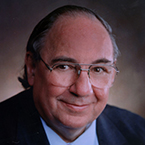
“Cancer is your body’s genetic tape playing the wrong song at the wrong time.”
“The solution to cancer will be a strange simplicity.”
Donald S. Coffey, PhD, FAACR, Past President of the AACR (1997-1998) and Fellow of the AACR Academy, died Nov. 9, 2017, at the age of 85. Coffey was the Catherine Iola and J. Smith Michael Distinguished Professor of Urology at Johns Hopkins University in Baltimore.
Coffey was an internationally recognized research scientist who made seminal contributions to numerous areas of cancer research, as well as an outstanding leader and dedicated mentor to young investigators. He was also a passionate advocate for sustained increases in funding for cancer research.
Coffey made many important discoveries about abnormal and normal cell behavior and launched major new research avenues in cell biology; he is widely known for his discovery of the nuclear matrix and the fact that DNA synthesis occurs on this matrix. He characterized the first Dunning animal models, which are used to isolate tumor metastasis genes and design chemotherapy regimens in prostate cancer. Coffey was the first to establish methods to identify androgen-insensitive prostate tumors and to elucidate the mechanisms of clonal selection in this insensitivity. He also did groundbreaking work on telomerase in prostate cancer and contributed to the first prostate cancer gene therapy trial ever conducted.
Coffey became an AACR member in 1976. In addition to his tenure as president from 1997 to 1998, he was a member of the AACR Board of Directors (1993-1996) and Nominating Committee (2001-2003), cochair of the Science Education Committee, program chair of the AACR Annual Meeting 1995, and a member of the Public Education Committee and Long-range Planning Committee, as well as associate editor of Cancer Research. He has also provided his mentorship in the Scientist ‘survivor Program and for early-career scientists.
The AACR inducted Coffey into the inaugural class of Fellows of the AACR Academy in 2013. In 2015, his tremendous leadership and profound contributions to cancer research were recognized with the AACR Margaret Foti Award for Leadership and Extraordinary Achievements in Cancer Research.
The American Association for Cancer Research (AACR) is deeply saddened by the loss of Dr. Donald Coffey,” said Margaret Foti, PhD, MD (hc), chief executive officer of the AACR. “His outstanding leadership skills, dedication to mentoring young investigators, passionate advocacy for sustained increases in funding for cancer research, and remarkable ability to translate complex scientific concepts into lay language made him an icon in the field and a true champion of cancer research. In his memory and honor, we will do our utmost to work even harder to expedite the prevention and cure of all cancers.
Born Oct. 10, 1932, in Bristol, Tennessee, Coffey received a bachelor ‘s degree from East Tennessee State University in 1957, having worked as a chemist at the North American Rayon Corporation during his final two years of school. Upon graduating, Coffey spent two years as a chemical engineer at the Westinghouse Corporation in Baltimore. He began his tenure at Johns Hopkins in 1959, joining the Johns Hopkins Hospital as acting director of the Brady Urological Research Laboratory. He also received his doctorate from the university ‘s medical school in 1964.
Additionally, he was an adjunct professor of medicine at Howard University in Washington, D.C. Coffey served in various other leadership positions throughout his career, including president of the Society for Basic Urological Research, national chair of the National Cancer Institute ‘s National Prostatic Cancer Program, and director of the Brady Laboratory for Reproductive Biology and the research laboratories in the Department of Urology at Johns Hopkins. He also served on the National Cancer Advisory Board and the board of directors of the National Coalition for Cancer Research.
Coffey was recognized with numerous other honors throughout his career, including the St. Paul ‘s Medal from the British Association of Urological Surgeons, the Achievement Award from the American Urological Association, the First Yamanouchi Award from the Society of International Urology, the Eugene Fuller Prostate Award from the American Urological Society, and the Falk Award from the National Institute of Environmental Science.
Career Highlights
2006-2012 National Cancer Advisory Board
2005 St. Paul ‘s Medal, British Association of Urological Surgeons
2001 Achievement Award, American Urological Association
1997-1998 President, AACR
1997 Board of Directors, National Coalition for Cancer Research, Washington DC
1994 First Yamanouchi Award, Society of International Urology
1993-1996 Board of Directors, AACR
1992 Eugene Fuller Prostate Award, American Urological Society
1989 Falk Award, National Institute of Environmental Science
1988 President, Society for Basic Urological Research
1984-1988 National Chairman, National Prostatic Cancer Program, National Cancer Institute
1977 D.Sc. (hon), King College
1974-2004 Director, Research Laboratories, Department of Urology, The Johns Hopkins Hospital
1969-1974 Director, Brady Laboratory for Reproductive Biology, The Johns Hopkins Hospital
1964 PhD, Johns Hopkins University School of Medicine